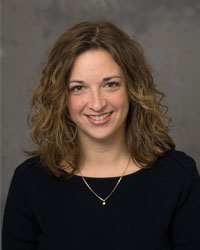BTN.com staff, May 2, 2015
 If Tamara Moore, an associate professor of engineering education at Purdue University, had the power to do so, she probably would strike a certain four-letter word from the dictionary. That word is ?nerd.?
If Tamara Moore, an associate professor of engineering education at Purdue University, had the power to do so, she probably would strike a certain four-letter word from the dictionary. That word is ?nerd.?
?Believe or not, I?ve heard that before,? Moore said, laughing.
But Moore turns serious when she discusses how the U.S. public education system is shortchanging the future engineers of America.
In a research paper published in March 2015 in the Journal of Research in Science Teaching, Moore and her colleagues report engineering education in public schools generally fails to clearly define and lay out engineering topics in K-12 science curricula.
In fact, according to that report, only 12 states clearly define such standards, and only four of these present a ?comprehensive? inclusion of engineering: Minnesota, Maine, Massachusetts and Oregon. The report noted that New York, Pennsylvania and Washington were nearly comprehensive. Five other states - Illinois, Indiana, Kansas, Oklahoma and Texas - were non-comprehensive.
Sadly, Moore said, all the other states lack any sort of engineering standard in science subjects at all. But she?s making an effort to change that.
The research she?s working on is helping fuel a curriculum-development project called EngrTEAMS - Engineering to Transform the Education of Analysis, Measurement and Science, an $8 million National Science Foundation-funded research project. The researchers are working with 200 teachers in St. Paul, Minn., and surrounding suburbs, to introduce the approach for 15,000 students in fourth through eighth grades.
According to Moore, this is a necessary first step in improving engineering education around the country. But beyond educational reforms, there should be a push to downplay the ?nerd? stereotype that?s long been attached to engineers.
?I want kids to see engineering as more than building buildings or bridges,? Moore says. ?They are in our lives every day, and in every respect. Each technology out there, anything man-made, is generally a credit to an engineer. That?s a really amazing thing people should know.?
To help spread the word on the value of an engineering education, Moore is actively involved in Purdue?s INSPIRE Institute for Precollege Engineering. Established in 2006 and based in the School of Engineering Education, the Institute is operated by five professors and three staff members whose goal is to make this field more accessible and user-friendly to young people who might not see math as their strong suit.
But Moore, a former math teacher who got bit by the engineering bug during her early college days, said students shouldn?t think the subject is all about number-crunching.
?You do have to be competent mathematically, but not the best mathematician in the world,? she explained.
[btn-post-package]At the heart of engineering, Moore said, is utilizing practical, problem-solving skills. Moore likes to tell young students that engineers could be responsible for figuring out ways to improve hip-joint replacements for 65-year-old grandmothers so that the coatings and materials used last longer, potentially sparing their loved ones additional surgeries in their twilight years.
Another factor that can help Moore and others make the case for pursuing an engineering career is the income potential. According the U.S. Department of Labor?s Bureau of Labor Statistics, engineers have a mean annual salary of more than $96,000 annually.
Still, what ultimately makes engineering an appealing career is the chance to solve problems and make the world a better place, Moore said.
?[Engineers] can solve problems in everyday life with an analytical bent and understanding,? Moore said. ?It?s okay to fail and fix it. Those skills are important and make students productive citizens. That?s the basis of what all of us at INSPIRE are trying to get students and teachers to understand.
?I want all students to have access to great education, and I want every child to have a choice to be what they want to be,? she added. ?If you want to be an engineer, you can.?
By Tony Moton







 See what's coming up live on B1G+ every day of the season at BigTenPlus.com.
See what's coming up live on B1G+ every day of the season at BigTenPlus.com. 